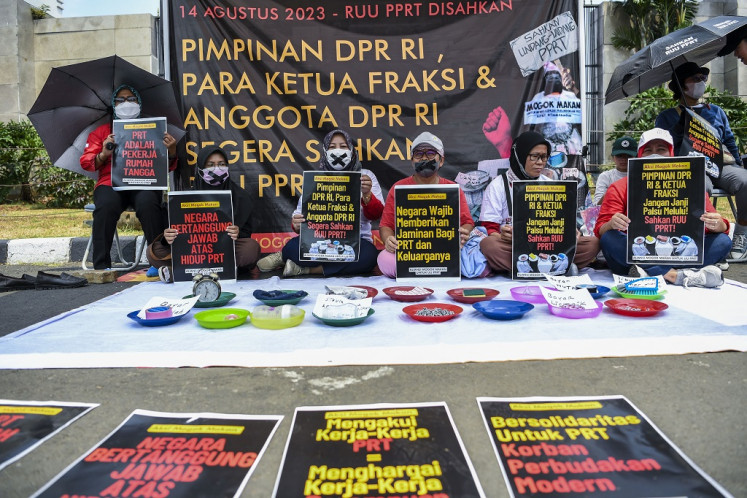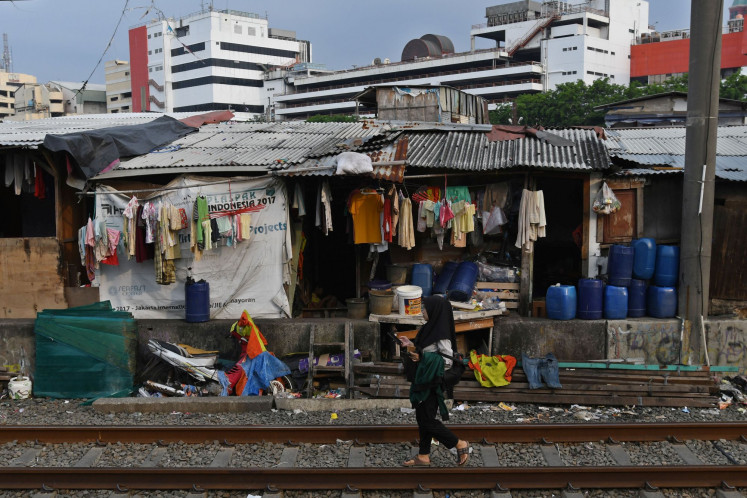Popular Reads
Top Results
Can't find what you're looking for?
View all search resultsPopular Reads
Top Results
Can't find what you're looking for?
View all search resultsSP4N-LAPOR! and Indonesia’s penchant for smart governance
Despite the pandemic, working as an integrated system, LAPOR! processed nearly 200,000 civil petitions filed by Indonesians in 2020, with 72 percent of those acknowledged within five days
Change text size
Gift Premium Articles
to Anyone
 The Jakarta administration applies smart city concept which allows residents to report and find information on any public facilities in the capital. Jakarta Governor Basuki (Photo taken from smartcity.jakarta.go.id/-)
The Jakarta administration applies smart city concept which allows residents to report and find information on any public facilities in the capital. Jakarta Governor Basuki (Photo taken from smartcity.jakarta.go.id/-)
W
hen the COVID-19 lockdowns were imposed last year, communities in South Kalimantan regency of Tabalong witnessed a violation of the lockdown rules with the gatherings at a local café. With the risks in mind, the communities reported the breach to the national government digital complaints handling system – SP4N-LAPOR! In no time, surveillance teams were deployed to disperse the crowd, ensuring a quick response to the situation.
The incident in Tabalong is just one of many examples that illustrate Indonesians’ growing penchant for digital technology to ensure the continuity and excellence of public services. Indeed, approximately two hundred thousand reports, ranging from vaccines to government social assistances (Bansos) queries were submitted last year to the platform, managed by the Administrative and Bureaucratic Reform Ministry (KemenPAN-RB).
The high participation rate indicates a strong appetite among the public to take advantage on the opportunity to reach the government and make their concerns be heard through the use of digital technology.
SP4N-LAPOR! also demonstrates how new technology is reshaping the way the government functions into a smart governance, with an emphasis on civic participation. A model that allows governments to manage complaints and feedback through a centralized system, as well as for citizens to submit real-time input on critical public services.
But as Indonesia embraces new technology for smart governance, is enough being done to ensure the effectiveness of civic participation with digital technology? Is the country ready to adopt digital governance to leave no one behind?
The answers lie in two pillars; a stronger and more inclusive approach to build greater transparency and accountability with wider civic participation from women and from vulnerable groups and a strategy to address digital divide among Indonesia’s 270 million people spread out in this vast country.
To this end, SP4N-LAPOR!, with support from the UNDP and the Korean International Cooperation Agency (KOICA,) has implemented a number of some key components to strengthen digital governance across the country.
Take, for example, the level of feedback response and speed: despite the pandemic, working as an integrated system, LAPOR! processed nearly 200,000 civil petitions filed by Indonesians in 2020, with 72 percent of those acknowledged within five days. In 2021, the rate was 82 percent, with 10 percent more reports acknowledged at the same time.
SP4N-LAPOR! was initially launched through the collaboration of the Office of the President (KSP), the Ombudsman of the Republic of Indonesia (ORI), and KemenPAN-RB, which also is in charge of managing the SP4N-LAPOR! on a daily basis. The Communications and Information Ministry and the Home Ministry have recently joined forces to support the application.
Since its launch in 2015, the digital platform has evolved to become one of the most trusted government tools. According to a UNDP-commissioned 2020 citizen satisfaction survey, approximately 75.7 percent of Indonesians polled were satisfied with the system. This satisfaction rate is higher than the previous year’s survey, which was at 72 percent. Furthermore, at least 89 percent of the respondents said that they will continue to use SP4N-LAPOR! to submit their complaints. The nationwide 2020 survey involved 1,329 respondents in Indonesia’s 34 provinces
SP4N-LAPOR! also provides insights into which aspects of public service delivery are citizens most interested in as well as how improvements can be made by tapping into the Artificial Intelligence (AI) technology and data analytics. SP4N-LAPOR! receives thousands of petitions daily regarding various public services. Prospective cases are becoming increasingly obscured by mountain of data, making it difficult to the heart of the matter.
So how do you make relevant follow ups in the midst of onslaught information? This is where AI comes in, classifying trends of reports by nature of issues and groups/regions/gender, allowing SP4N-LAPOR! to assigns petitions to state agencies with the necessary authority.
The use of AI also signals Indonesia’s growing familiarity with a technological trend that has been adopted by industrialized countries such as South Korea, whose citizen reporting portal e-People is regarded as a model for the Indonesian SP4N-LAPOR!
Digital transformation will not come into full circle without meaningful participation from all groups of society, including those who are at the risk of being left behind. In light of this, KemenPANRB recently issued a regulation making it easier for women and people with disabilities to use SPAN-LAPOR! As a result, new digital features are also being added to web and mobile applications to allow for mandatory reporting of the user’s age and gender identity.
This latest improvement is expected to promote inclusion and generate new data to inform gender responsive policy and public service delivery.
But the expansion of digital technology also underscores Indonesia’s challenges in digital divide. According to a 2018 report by the Indonesian Internet Providers Association, the main of Java is home to more than half of the country’s internet users, indicating a divide in access and infrastructure. Given Indonesia’s vast diversity, each of the provinces outside Java Island has varying terrain and populations, making for a unique set of challenges.
The government has already set aside US$2.5 billion in the current budget to bolster the country’s information and technology. But, addressing this challenge will require stronger multi-stakeholder collaboration, particularly with the private sector which can fill the gap of financing through public-private partnership scheme.
The future of SP4N-LAPOR! is about the future of Indonesia’s smart governance. With the continued expansion of digital access and improved connectivity, it will only be a matter of time before the system can address a slew of concerns – from any citizen, from anywhere across the archipelago as the country works to build a better future.
***
Diah Natalisa is deputy to administrative and bureaucratic reform minister for public services. Sophie Kemkhadze is UNDP Indonesia deputy resident representative.









